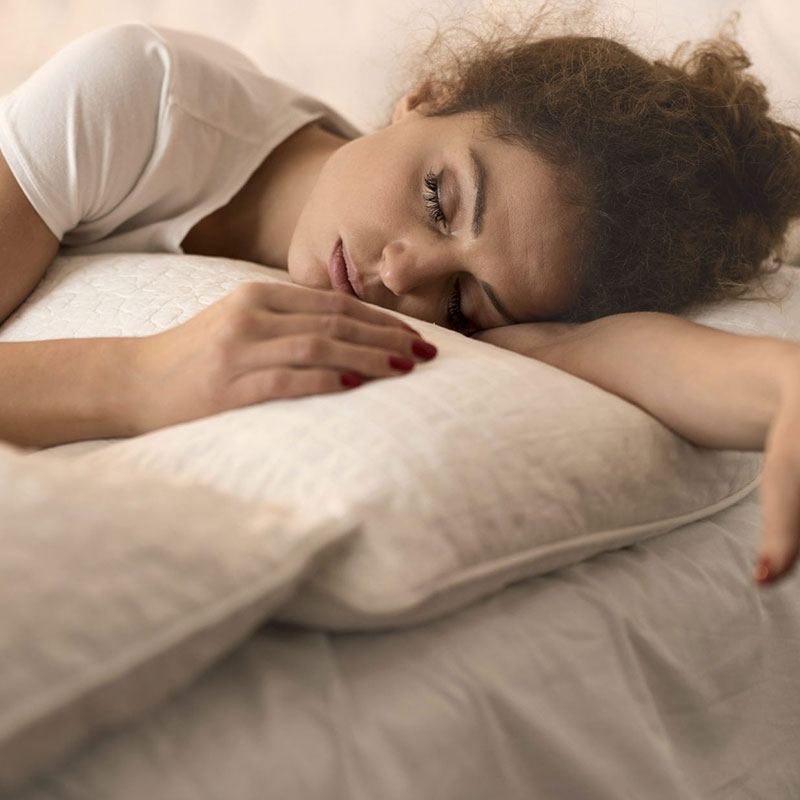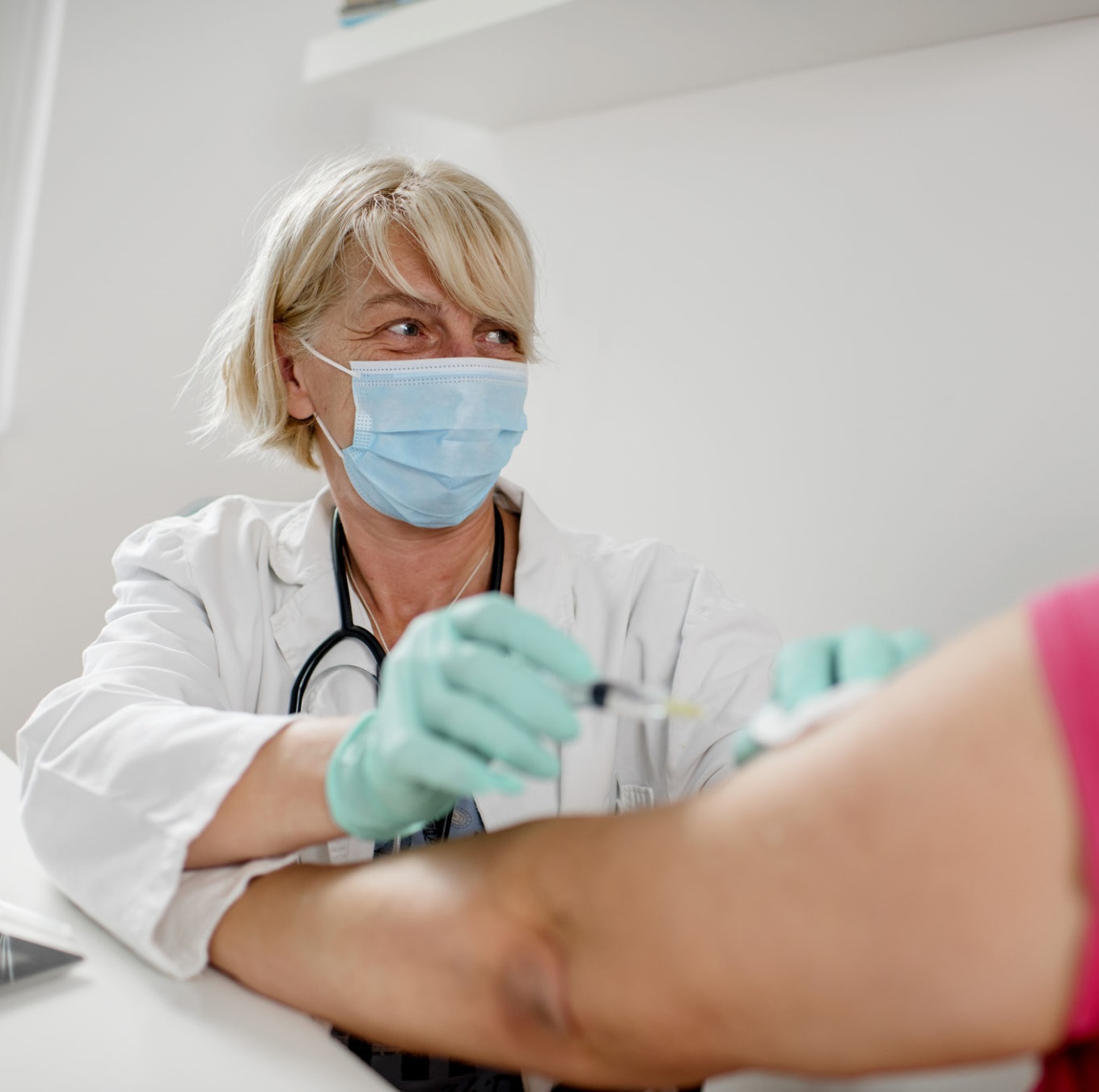How to Sleep Better During the Coronavirus Crisis

November 10, 2021
By: Katie Woehnker
As we adjust to life in quarantine, it’s important to not let new habits form that can be disruptive to your sleep, like staying up late or becoming overwhelmed with anxiety.
“A lot of recovery happens during sleep,” shares Adrian Pristas, M.D., medical director of Sleep Medicine at Bayshore Medical Center and Riverview Medical Center. “Sleep influences our immune system, and those that don’t sleep as well tend to be sicker. In the current crisis we’re facing, your sleep is more important than ever.”
Disrupted Routines Can Lead to Difficulty Sleeping – Make a Schedule for Your New Normal
Working from home can be a big adjustment, and if you add home schooling your little ones, this is uncharted territory.
- Set time tables for things like school work, outside time, exercise, relaxation, etc.
- Get the whole family involved
- Keep consistent bedtimes and wakeup times
- Cut off screen time at least one hour before bedtime
- Keep the blinds open to wake up with natural light
“Children are also experiencing difficulty sleeping because of anxiety, stress or simply from having their usual schedule disrupted,” shares Pakkay Ngai, M.D., pediatric pulmonologist / sleep medicine specialist at Hackensack University Medical Center and Medical Director at Palisades Medical Center. “Be open with your kids about what’s going on and reinforce a feeling of safety. Keeping consistency is key – children find comfort in structure, there are less variables for unexpected change.”
“Lead by example, continue to be a good role model with your sleep habits. And although your children are now more reliant on electronics for education and leisure, it’s still important to limit screen time, especially for the couple of hours before bedtime.”
“It can be tempting to stay up later and sleep in, but the better you can keep to your typical schedule, the better off you’ll be,” Dr. Pristas mentions. “Everyone has a circadian rhythm, or internal clock, that’s activated by certain cues in our routines. Keeping a consistent routine will help you fall asleep easier and sleep better.”
For our emergency and essential personnel, your schedules might also be disrupted with extra shifts and added stress. “Try to maintain some normalcy – when you come home, disconnect from the work day, take some time to relax and try to keep your sleep routine as best you can,” shares Dr. Pristas.
Quarantine Causing Sedentary Lifestyle – Get Inventive and Stay Active
“Make sure that physical activity is also part of your daily routine; use being home as an opportunity to get in better shape. Whether you have a backyard or workout equipment at home, you may have to get inventive on how you spend your time,” Dr. Pristas adds.
- Use workout videos to stay active indoors
- Take a walk outside, while keeping proper social distance
Getting regular physical activity can have a positive impact on your mental health. Exercise can help combat anxiety, improve your sleep quality and help you sleep longer.
Snack Foods and Alcohol as Temporary Comfort – Be Mindful of Your Intake
Stress and anxiety can release the hormone cortisol, which can trigger emotional eating.
Being overweight is a risk factor for obstructive sleep apnea (OSA), causing breathing to stop and start throughout sleep. It can become a vicious cycle – eating poorly can lead to weight gain which can lead to OSA. Poor-quality sleep can then make weight loss even harder because of the chronic fatigue.
“Any patients recovering from illness that have OSA and use a continuous positive airway pressure (CPAP) machine should consult their sleep physician about usage and proper cleaning techniques,” Dr. Pristas advises.
- Buy nutritious and filling foods over snacks like chips or pretzels
- Keep your scheduled meal times, avoid snacking all day long
- Limit alcohol intake
“Alcohol might seem like a good temporary aid for your anxiety and to help you sleep, however, it’s not going to help you in the long run,” cautions Divya Gupta, M.D., neurologist, sleep medicine specialist and Medical Director at JFK Medical Center. “Alcohol actually disturbs your sleep. So, while you feel like you may fall asleep faster, it’s not going to be a restful, restorative kind of sleep and there may be early morning awakenings.”
If you do have alcohol, Dr. Gupta recommends consumption 2 to 3 hours before bedtime and limiting your intake. Alcohol can worsen sleep disordered breathing and shouldn’t be combined with other sleep aids.
24-Hour Updates on COVID-19 – Remember to Disconnect
“Stress and anxiety factor into your sleep, and this can be how insomnia starts,” adds Dr. Pristas. “We all have stressful days and losing a night of sleep here and there won’t have major consequences, but when we develop habits around stress that keep us awake at night repeatedly, that’s when you’ll have a problem.”
Limit your consumption of the news and COVID-related media, and use your free time to catch up on things like reading a novel or tackling home projects like painting or reorganizing.
“It’s important that we find a way to put the stress away, so we can get a good night’s sleep.”
If You’re Sick, Listen to Your Body and Rest
“If you are sick, it’s likely you’ll be tired. When your body reacts to things like a virus or infection, hormones are elevated that can make you feel sleepy – listen to these cues, sleep is crucial for recovering from illness,” says John Villa, D.O., pulmonologist, sleep medicine specialist and Medical Director at Hackensack University Medical Center.
“Try sleeping as much as you can at night, but you’ll probably need a nap during the day too. It’s okay to rest and recover, but once you’re well just make sure you get back to your normal schedule.”
The material provided through HealthU is intended to be used as general information only and should not replace the advice of your physician. Always consult your physician for individual care.
Find a doctor near me
Why Kids Need Vitamin D Supplements in the Winter

Kids need vitamin D in winter. Learn why supplements are important for bone health and how much your child needs. Consult your doctor.
Is Keto Bad for Your Heart?

Is Keto Bad for Your Heart? Learn about potential risks and benefits from Drs. Dougherty & Hollywood. Get expert advice; call 800-822-8905.
Find a doctor near me

Maintaining Your Fitness Goals with Wearables
Maintain your fitness goals using wearables. Learn about smartwatches, fitness trackers, and more. Improve your health journey today.

What If I Like Being Quarantined?
Adjusting to life outside quarantine? Learn coping strategies for anxiety and stress from Dr. Mishra. Manage your return to normalcy. Schedule your wellness visit today.

Is an Irregular Heartbeat Normal?
Most children diagnosed with an irregular heartbeat are found to have conditions that are normal and harmless.

Reduce Your Fear of Needles
A fear of needles can seem debilitating. Here are some tips to help overcome the phobia.
